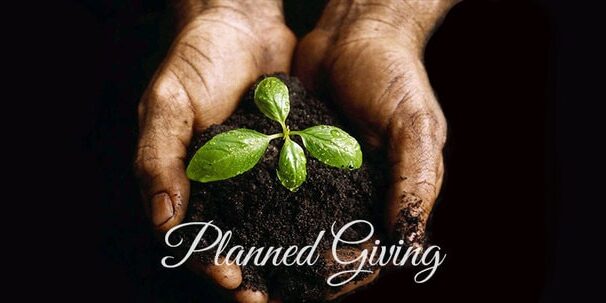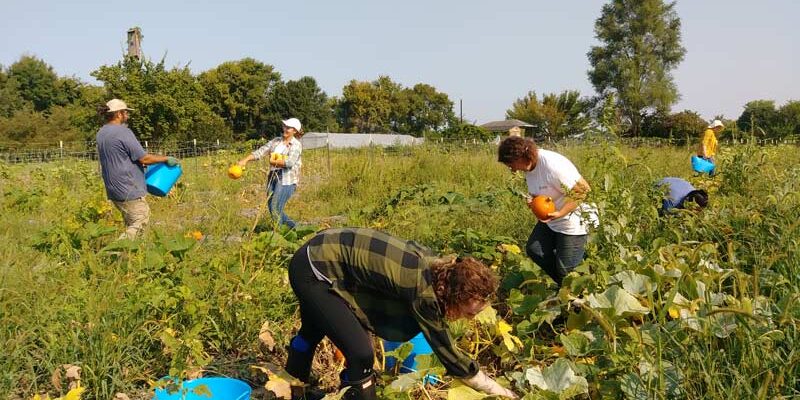Earth Day Every Day: How land, animals, plants and poop are all connected
“When we try to pick out anything by itself, we find it hitched to everything else in the Universe.”
John Muir

It all starts when our alpacas lift their tails. A journey begins that has a shared ending: the restoration of our land.
Every day, we collect the poop in our alpaca barns. Our neighbor, Saint Mary-of-the-Woods College, does the same with its horses. We dutifully take it to our composting system, where it’s joined by food scraps, paper towels, sawdust, straw, hay, chicken manure and weeds. Then, this collection conspires with time, weather, bacteria, fungi, wildlife, worms and even our tractors to help break down and mix it all together. The results are beautiful, black compost.
Why do we need compost?
The compost is then used to amend our soil. Here at White Violet Center, our soil is full of clay. That can make for difficult growing conditions. By adding loose organic matter in the form of compost, we can improve our soil structure while also fertilizing it with the nitrogen, phosphorus, potassium and other micronutrients and microorganisms that exist in the compost.
When we spread that compost on our fields our plants thrive and, at the same time, we are able to put back into our land what we take out through farming. We end up with delicious and nutritious vegetables and fruits (unfortunately, the deer and groundhogs around here get to enjoy it too). Damaged crops get fed to our chickens, improving their health, wellbeing and the quality of their eggs which we can enjoy as yet another delicious and nutritious food. The resident bee colonies have a constant source of strong flowering plants to collect pollen from and feed their hives. Hives produce honey which, you guessed it, is another delicious and nutritious food.
The healthier soils also help reduce erosion and runoff, absorb water after excessive rainfall and house millions of beneficial bacteria, insects, fungi and minerals. And it all starts with poop.
Good poop vs. bad poop

Poop has been helping protect our environment and feed our soils for ages. Unfortunately, humans have ruined this beneficial balance and now find ourselves in a crisis of our own doing because we’re responsible for creating too much of the wrong kinds of poop. Talk about a crappy situation. We’ve reduced the planet’s biodiversity while exponentially increasing just a few kinds of excrement, most notably cow and pig poop. It’s being produced at such high levels that we can’t benefit from it. We’re dumping on our only home: planet Earth.
So, what can we do? Well, it starts by eating less beef and pork. But it’s also important to understand where our food comes from and how it’s grown. Hamburgers and bacon don’t have to be our enemy. There’s a sustainable way to produce and consume it, just as there is for vegetable, fruit, flower and even textile production. Whether we like it or not, it’s all connected. We’re all connected. So why not nurture and strengthen those connections for the benefit of all? On our farm, just follow the alpaca droppings. Handled correctly, they are part of a system that benefits so many things:
- Humans
- Worms and insects
- Bees and honey
- Soil
- Vegetables and fruit
- Alpacas, fiber and yarn
- Flowers
- Wildlife
- Erosion control
- Chickens and eggs
- Water
- Fungi
- Bacteria
It does all this by traveling less than a few hundred yards. Think of it as an intricate spider’s web where each strand of silk is connected. It’s called a food web.
What can you do?
You can have a positive impact on your food web, while also restoring the soil and benefiting your local community. Compost your own food scraps, paper towels and napkins. Use that compost to grow healthier flowers and backyard vegetable gardens. Get to know your farmers. Ask them how they grow their food, treat their animals and maintain a healthy food web. Ask them what they do to put back what they take from the land. For more ideas and tips go to whiteviolet.org or schedule a tour of the farm. You might even get a chance to see how it all starts. Just look for the telltale sign of an alpaca lifting its tail.
Earth Day Every Day
Visit our Earth Day Every Day page to find out more about caring for our planet.


